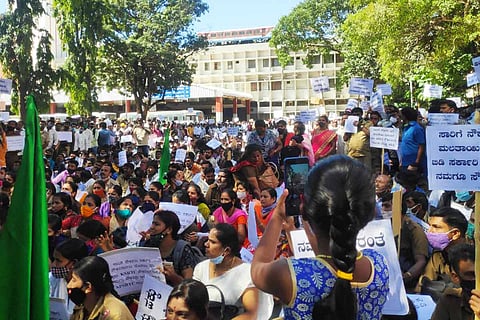

Why did the three-day strike by the Karnataka State Road Transport Corporation (KSRTC) and Bangalore Metropolitan Transport Corporation (BMTC) bus employees — which in the last 30 decades was led by “comrades'” — turn into one backed by green shawl-draped farmers?
There was no change of guard, but just that the Karnataka Rajya Raitha Sangha (Hasiru Sene), a farmers group, led by Kodihalli Chandrashekar, chose to test waters in the trade union arena by taking up the cause of the KSRTC and BMTC employees, where discontent was brewing on the working conditions, particularly the demand for treating them as state government employees. However, Chandrashekar's attempts were slammed by the state government and he was not made part of the negotiations between the striking employees representatives and the government.
According to KSRTC Staff and Workers' Federation president H V Anantha Subbarao, whose union has been recognised by the Supreme Court for all negotiations, it was a hasty move by the young blood in the organisation, who were unhappy with the poor working conditions and enamoured by getting the government employee tag.
“They approached the farmers association, which hurriedly registered itself under the Karnataka Societies Registration Act and gave a call for the flash bus strike. We just allowed Chandrashekar to take the lead and did not want to break the strike,'' he added.
Kodihalli Chandrashekar, the 62-year-old farmer leader hails from Kodihalli, a village in Arsikere in Hassan district, but is based in Bengaluru. Incidentally, Subbarao is from neighbouring Arkalgud taluk also in Hassan district.
Chandrashekar tried his hand in politics by contesting from Hassan Assembly constituency in 2013 but polled just 900-odd votes. He has done three movies in Kannada. He played the role of a judge in T N Seetharam's Muktha, as a superintendent of police in Kolar and played himself in Shivrajkumar-starrer Mylaari.
With the state-wide buses strike paralysing the movement of people, Chandrashekar's plan of being the main negotiator with the state government was a cropper. Even as the KRRS representatives staged dharna with the striking employees at the Freedom Park in Bengaluru, the state government held discussions with the Federation and other splinter unions of the KSRTC, keeping the KRRS out.
“We were approached by the KSRTC employees to lead the strike. After all, the employees are also farmers. Our association was founded by late M D Nanjundaswamy and has 41 years of credibility,'' Bhaktarahalli Byregowda, general secretary, KRRS said.
Subbarao said the KRRS had no locus standi for the government to hold negotiations with them as it was only a Ookuta (organisation) registered under the Societies Act. Besides, a 22-day notice has to be given by any trade union for going on strike, he maintained. The federation, Subbarao said, is also not in favour of the 1.25 lakh staff, including those from BMTC, being treated as government employees.
“Andhra Pradesh Chief Minister Y S Jagan Mohan Reddy kept up his promise of treating the AP KSRTC employees on par with the government staff from January 2020. This does not work out for us because following a merger, one cannot be part of any trade union.”
“Presently, we can have pay negotiations once in five years but as government employees, we have to wait for the Pay Commission's Recommendations,'' Subbarao added.
Chandrashekar's foray into the trade union sector also did not seem to find acceptance by other farmers groups. Kurubur Shanthakumar of Karnataka Rajya Raitha Sangha Ookuta said Chandrashekar should not have not ventured into taking the lead in the employees strike. “The strike inconvenienced the farmers who could not bring their produce from various places. Trade union activities are not our domain and we should be supporting the farmers who are agitating in New Delhi against the farms reforms bills,'' he added.